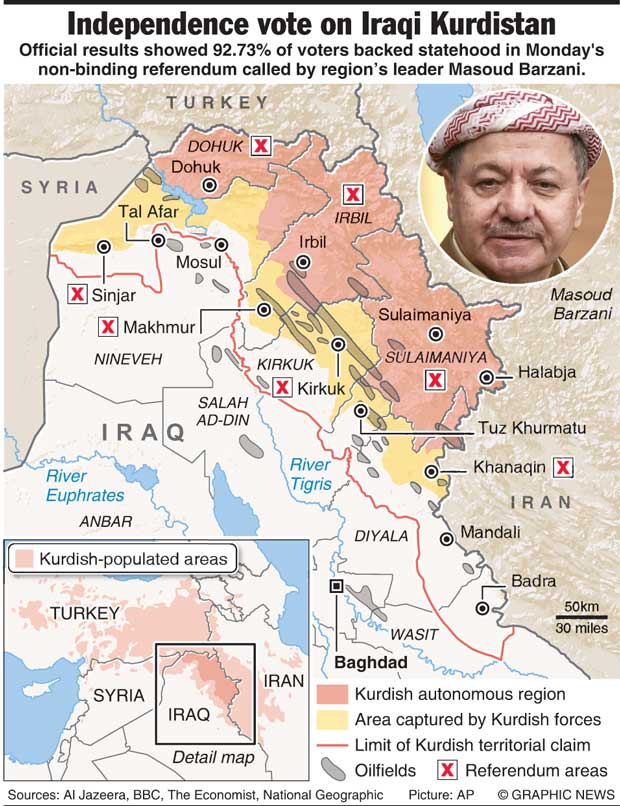Kurdistan referendum: Another flashpoint in West Asia

In what could be a trigger for another major conflict in West Asia, Kurds in Iraq on Monday voted overwhelmingly for separation. More than 92 percent of the people – Kurds and non-Kurds in the autonomous Kurdistan region in Iraq – voted yes, delivering a powerful message to Iraq and its neighbours that the Kurds’ dream of finally achieving a state of their own will soon be a reality.
The Iraqi Kurds’ victory at the non-binding referendum was greeted with a virtual declaration of war by Iraq, Turkey, and Iran. The preparation for the war has already
 begun. If the separation takes place, it will cause a cataclysmic upheaval in West Asia’s geopolitics. The referendum will be remembered as another disastrous byproduct of the United States’ Iraq war. As though the millions of deaths, destruction and displacement were not enough, the US war for oil and military contracts is now set to drag the bloodied region into another dark period of uncertainty and violence. This is happening at a time when the region is just witnessing the end of a long haul battle against the Islamic State terror group.
begun. If the separation takes place, it will cause a cataclysmic upheaval in West Asia’s geopolitics. The referendum will be remembered as another disastrous byproduct of the United States’ Iraq war. As though the millions of deaths, destruction and displacement were not enough, the US war for oil and military contracts is now set to drag the bloodied region into another dark period of uncertainty and violence. This is happening at a time when the region is just witnessing the end of a long haul battle against the Islamic State terror group.There has already been a lot of bad blood between the Kurds and Iraq’s Arabs, both the Sunnis and the Shiites. It was with the help of the Kurds that the US troops first broke into Iraq in 2003 from the north of the country. Being the Americans’ fifth columnists, the Kurds have, in the new federal constitution gained more political rights, much to the chagrin of the Iraqi Arabs.
As though the millions of deaths, destruction and displacement were not enough, the US war for oil and military contracts is now set to drag the bloodied region into another dark period of uncertainty and violence
In terms of the US-guided constitution, the country’s presidency goes to a Kurd. The constitution recognises the right to return of those Kurds who have expelled from the oil-rich Kirkuk area during Saddam Hussein’s arabisation programme. It allows the Kurdistan Regional Government (KRG) to conduct foreign relations and maintain its own security forces, known as Peshmerga, which played a key role in the defeat of the IS. The region has its own President, Prime Minister and parliament.
In addition to these and many more constitutional rights, the Kurds have arrogated upon themselves the right to sell oil to foreign companies in contravention of Iraq’s laws.
The only factor that has prevented them from declaring a separate state is their fear that their landlocked Kurdistan will not survive if the neighbours turn hostile. Already Turkey has warned of an economic blockade if the Kurds declare their independent state. Iraq’s Prime Minister Haider al-Abadi is livid that his request to Kurdish leaders to cancel the referendum has gone unheeded. The Kurds had committed a historic mistake, he said on Tuesday and warned that Iraqi troops would take over the region’s international airport at Arbil today if it is not handed over to the state before the deadline. Iraq yesterday called on international airlines to avoid the airport. Abadi also ordered the KRG to send all oil revenue to the centre.
Abadi said he was ready for a dialogue for greater autonomy within Iraq’s constitution.
But on Wednesday, a defiant Abadi told Iraq’s parliament, which is being boycotted by Kurdish members, that there was no question of using the result of the referendum as the basis for talks. “We will impose Iraqi law in the entire region of Kurdistan under the constitution,” he said, while parliament urged him to take “all necessary measures to maintain Iraq’s unity”.
The Pentagon, which maintains close military ties with Iraqi and Syrian Kurds apparently holds a different view that goes with the policy of Israel, the only country which has welcomed Kurdistan’s independence bid
Sensing the growing international apprehension over Kurdistan becoming a flashpoint for a region-wide conflict, KRG leader Massud Barzani in a referendum victory speech tried to allay the fears of Baghdad and neighbouring countries. He said the vote would not lead to an immediate declaration of independence and should, instead, open the door to negotiations.
Meanwhile, Iran extending its support to the Iraqi government, has, moved artillery batteries to the border with Kurdistan, while Turkey, armed with parliamentary approval for cross border incursion, has amassed tanks and troops on its border with Iraq’s Kurdistan.
Turkey, Iran and Syria fear that an independent Kurdistan state out of Iraq could give a boost to Kurdish separatist movements in their countries. In Turkey and Iraq, Kurds make up 18 percent of the population; in Iran and Syria they are seven percent, in Armenia about 5 percent. Overall, more than 32 million Kurds live in a contiguous region spreading over these five countries. All these countries have attempted to de-Kurdise the Kurds. Saddam Hussein used military force and even chemical weapons to crush the Kurdish struggle for autonomy. In Syria, a Kurd cannot be given a Kurdish name. In Turkey, Kurds are not recognised as Kurds. They are called “mountain Turks”. It is illegal to use the Kurdish language in Turkish schools and public offices.
For the past four decades or so, Turkey has been fighting a separatist war against the Kurdistan Workers Party or the PKK, which has been declared a terrorist organisation by Turkey and its Nato allies.
In Iran, however, the Kurdish question has been, to a great extent, settled, with the Kurds integrating into the mainstream society. Teheran fears that an independent Kurdistan across the border would disturb this harmony and could turn the Iranian Kurds into a US and Israeli partner for an attack on Iran. Teheran has slammed the independent Iraqi Kurdistan as an ally of Israel.
It is not clear what the US position on the Kurdish issue is. A US State Department statement said the US “is deeply disappointed” that the regional government held the vote but that the “historic relationship with the people of the Iraqi Kurdistan Region will not change.” It also reiterated its belief that the referendum “will increase instability and hardships for the Kurdistan region and its people”.
But the Pentagon, which maintains close military ties with Iraqi and Syrian Kurds apparently holds a different view that goes with the policy of Israel, the only country which has welcomed Kurdistan’s independence bid. It is no secret that Israel wanted to balkanize every country in the region to weaken them and maintain its military superiority. In 2006, the Zionist friendly US Senate passed a resolution supporting the division of Iraq into three states – an Arab Shiite state, an Arab Sunni state and Kurdistan. The resolution was moved by Joe Biden, who later became president Barack Obama’s vice president.
Kurds are an ancient people with Indo-Iranian roots. They follow Sunni Islam, though some of them are adherents of Shiism. The great Islamic hero Salahuddin al-Ayyubi (Saladin) who recaptured Jerusalem from the Crusaders was a Kurd.
In 1920, two years after World War I ended, the creation of an independent Kurdish state emerged during the deliberations of the Treaty of Sèvres. Though the defeated Ottoman sultan agreed to the proposal, his Military chief Mustafa Kemal Ataturk opposed it, prompting the allied powers to launch a military campaign against Turkey. This war came to be known as Turkey’s war for independence. With the Turks’ victory in this war, the best chance the Kurds had to carve out an independent state disappeared.
The Kurds have got another opportunity 97 years later. But it is unlikely they can achieve independence without a fight.

